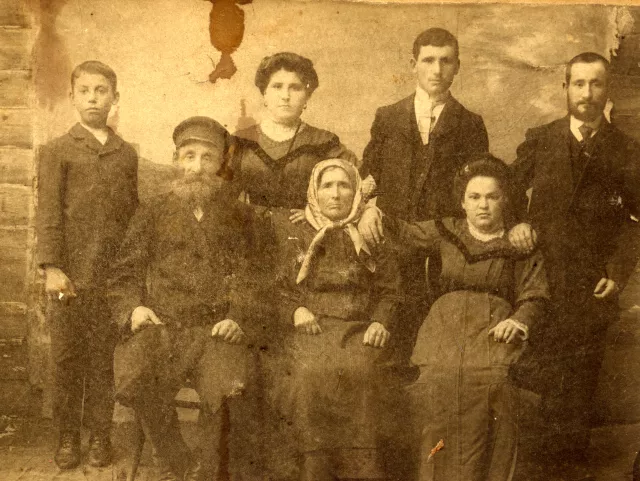This is my mother's family photo. In the center is grandmother Roiter wearing a kerchief, beside her is grandfather Iosif Roiter. The first from the right is my mother's brother, whose name I do not remember, beside him is her younger brother Ehil Roiter, sitting is my mother older brother's wife. In the center is my mother Elka Roiter. The little boy is my mother sister Sura's son, whose name I do not remember. This photo was taken in Chechelnik some time around 1916.
My mother came from the Ukrainian village of Kravetskoye [This village does not exist today. It might have merged with a bigger town or may have disappeared for some other reason.], near the Jewish town of Chechelnik. My mother's family was the only Jewish family in Kravetskoye. My grandfather's name was Iosif Roiter, but I don't know my grandmother's maiden name. They were born in the middle 19th century. My grandfather owned a store selling an assortment of everyday consumer goods. Besides, my grandfather's family rented a part of the river adjusting to the house and a mill. Every Friday my grandmother and her daughters sold the fish from the river in Chechelnik where Jewish housewives bought it for Sabbath. My grandfather's family worked from dawn till late in the evening and was well respected by Ukrainians, particularly that my grandfather was a very honest man.
The Roiter family also respected their neighbors. Mama told me they never worked on Sunday to be seen by Ukrainian villagers or on Christian holidays respecting the other people's religion. When the Roiters had candles lit in their house on Friday, their Ukrainian neighbors knew that Iosif could not take the money in his hands to sell his goods. They could come into the store, put the money where they knew and took whatever they needed. Not once did anybody cheated on my grandfather. On Saturday a Ukrainian woman came to my grandfather's home to do whatever chores were needed. Grandfather Iosif was rather religious. He prayed at home, and on holidays he went to the synagogue in Chechelnik with his wife and children.
Mama's oldest sister Sura's marriage was also prearranged. She lived with her family in the small town of Obodovka near Bershad. She was born in the 1870s. She was much older than mama, and her children were almost the same age as mama. Sura was a housewife and had two daughters.
My mother's two sisters and two brothers moved to Argentina during WWI. Mama corresponded with them at the beginning, but in the middle 1930s she terminated their correspondence and lost their track. My mother's youngest brother Ehil Roiter, born in 1897, served in the czarist army during WWI. He got into an Austrian captivity. Later he told his family about a good attitude toward the captives. When he returned, Ehil married a girl from a wealthy Jewish family Chechelnik. They owned horses, and this was the measurement of wealth at the time. During the Civil War in 1918 Ehil and his wife rode their own wagon to go a wedding in the neighboring village, when they were caught by a gang, one of many in Ukraine at the time. They killed Ehil, bullied his wife and let her go. Ehil was buried in the Jewish cemetery according to the ritual. My grandfather recited the Kaddish over his grave. My grandmother mourned after him for a long time. She never recovered from the loss of her son. She died shortly afterward in 1918. Ehil had no children. The family had no contacts with his wife.
Grandfather Iosif remarried soon. My mother Elka, born in 1895, had no education. She worked hard helping her parents about the house. Her stepmother was not good to her and mama knew she needed to take care of herself. At this moment Leya, a matchmaker from Bershad, came onto the scene. She showed mama a photo of my father with his brothers where they were photographed wearing posh fur hats. Mama agreed to marry him. Since her mother had died recently, there was actually no wedding. In early 1918 the bride and the bridegroom were married under a chuppah at the synagogue in Bershad.















